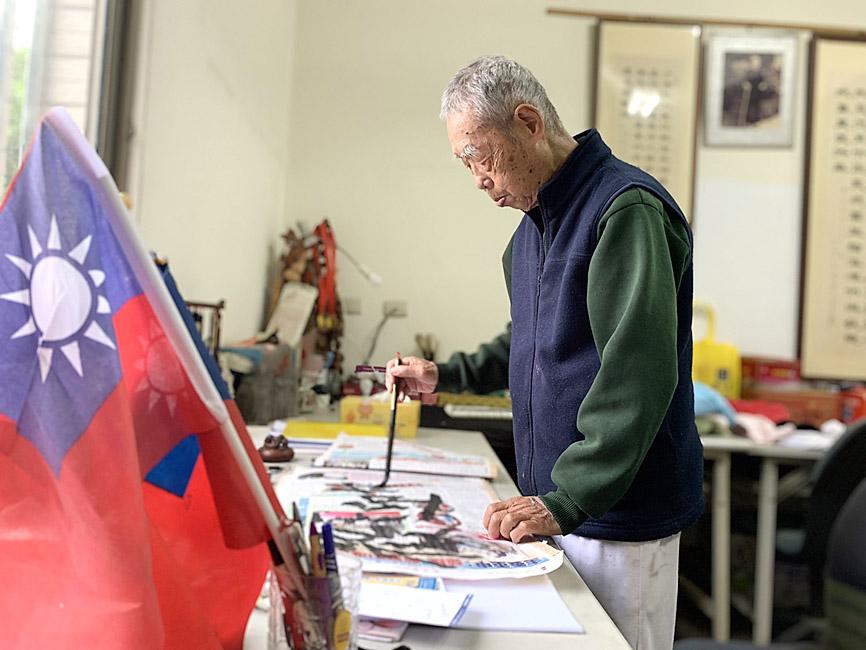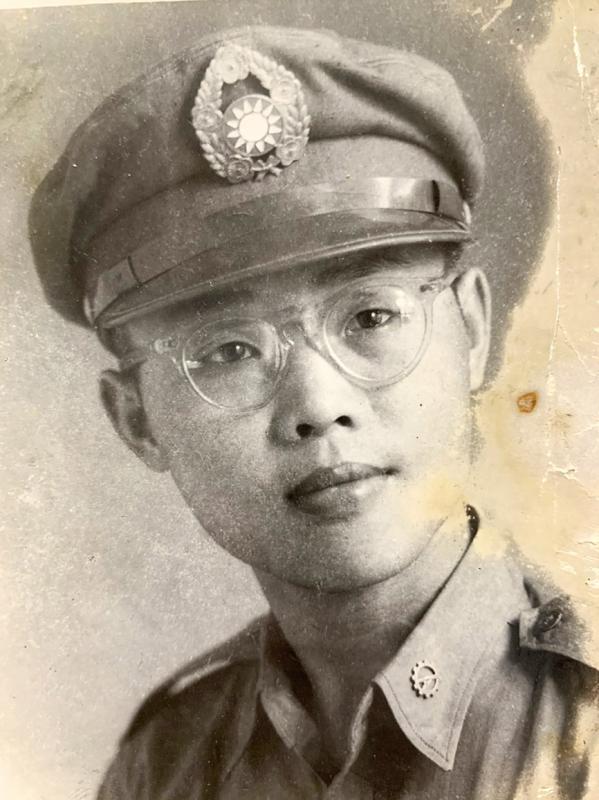A 90-year-old war veteran in Miaoli County who had been a prisoner of war in French-occupied Vietnam learned to use a computer in his old age to record his story.
Tao Ju-lang (陶如朗) was 18 when his Chinese Nationalist Party (KMT) unit in China was routed by communist forces during the Chinese Civil War.
The unit fled to the Vietnam border, but were only allowed entry if they laid down their weapons, Tao said, adding that he knew they would be made prisoners.

Photo: CNA
The men were held on Phu Quoc Island off southern Vietnam for four years, before being granted passage to Taiwan, he said.
Ten years ago, at age 80, Tao began learning how to use a computer to record his memories of the war and captivity, he said.
“That was a war-torn age,” he said, adding that he had walked across half of China during the war.

Photo courtesy of Tao Ju-lang
When the KMT retreated to Taiwan in 1949, he and his unit fled from Hengyang City in China’s Hunan Province toward the coastal city of Qinzhou in Guangxi Province, where they were to board a boat for Taiwan, he said.
Before the unit arrived in Qinzhou, the city was lost to the communists, so the unit rerouted north to the mountains near Nanning City, he said.
“We were chased by the communist forces the whole way, but the people in the mountains were also quite fearsome,” he said. “Basically, we had enemies in the front and rear.”
“The whole way there it was fortified villages and the people we encountered would extort us for passage,” Tao said. “They did not want money or valuables, they just wanted our weapons.”
The unit continued to fight and flee for about two weeks, with many soldiers dying along the way, he said.
He and the other remaining soldiers decided that their only option was to flee to Vietnam, where they were forced to lay down their remaining weapons and board a boat to Phu Quoc, he said.
“When we got to the island, it was completely barren. We were not acclimatized, we had no medicine and were completely worn out,” he said. “We did everything we could think of to survive. Then one day we heard someone yelling from the beach that a ship was approaching, and it was flying our national flag. We were so happy that we nearly went crazy.”
When he arrived in Taiwan in 1953, he discovered that the national anthem was played in public venues and people were required to stand for it and sing.
“I was so moved by this, I would cry every time,” he said.
Tao was assigned to an Air Force unit in Yunlin County’s Douliou City (斗六), but was reassigned as a military instructor after sustaining an injury during a night air-drop exercise.
He chose a post in Miaoli County, where his wife’s mother lived, he said.
When he decided to marry, he faced opposition from his soon-to-be mother-in-law, as he was a “soldier from China who had no money,” he said.
However, his father-in-law-to-be supported the marriage and things went more smoothly after that, he said, adding that he married and had three children.
His wife has had spinocerebellar atrophy for the past five years, which has caused her motor skills to worsen, but he remains optimistic and cares for her, Tao said.
Since he retired, he has been using his spare time to teach calligraphy in his community, he said, adding that he taught himself to use a computer to record the story of his four years in captivity.
When travel to China was opened up, Tao visited relatives there, including his mother, who was still alive at the time, he said.
“When I got there, I just knelt on the ground and couldn’t stop crying,” he said.
Having experienced so many things, if he could choose again, he might have stayed on Phu Quoc, he said.
“There was no politics there, no struggles, no rich and poor,” he said. “I would have just lived carefree and without worries.”

A group of Taiwanese-American and Tibetan-American students at Harvard University on Saturday disrupted Chinese Ambassador to the US Xie Feng’s (謝鋒) speech at the school, accusing him of being responsible for numerous human rights violations. Four students — two Taiwanese Americans and two from Tibet — held up banners inside a conference hall where Xie was delivering a speech at the opening ceremony of the Harvard Kennedy School China Conference 2024. In a video clip provided by the Coalition of Students Resisting the CCP (Chinese Communist Party), Taiwanese-American Cosette Wu (吳亭樺) and Tibetan-American Tsering Yangchen are seen holding banners that together read:

UNAWARE: Many people sit for long hours every day and eat unhealthy foods, putting them at greater risk of developing one of the ‘three highs,’ an expert said More than 30 percent of adults aged 40 or older who underwent a government-funded health exam were unaware they had at least one of the “three highs” — high blood pressure, high blood lipids or high blood sugar, the Health Promotion Administration (HPA) said yesterday. Among adults aged 40 or older who said they did not have any of the “three highs” before taking the health exam, more than 30 percent were found to have at least one of them, Adult Preventive Health Examination Service data from 2022 showed. People with long-term medical conditions such as hypertension or diabetes usually do not

Heat advisories were in effect for nine administrative regions yesterday afternoon as warm southwesterly winds pushed temperatures above 38°C in parts of southern Taiwan, the Central Weather Administration (CWA) said. As of 3:30pm yesterday, Tainan’s Yujing District (玉井) had recorded the day’s highest temperature of 39.7°C, though the measurement will not be included in Taiwan’s official heat records since Yujing is an automatic rather than manually operated weather station, the CWA said. Highs recorded in other areas were 38.7°C in Kaohsiung’s Neimen District (內門), 38.2°C in Chiayi City and 38.1°C in Pingtung’s Sandimen Township (三地門), CWA data showed. The spell of scorching

POLICE INVESTIGATING: A man said he quit his job as a nurse at Taipei Tzu Chi Hospital as he had been ‘disgusted’ by the behavior of his colleagues A man yesterday morning wrote online that he had witnessed nurses taking photographs and touching anesthetized patients inappropriately in Taipei Tzu Chi Hospital’s operating theaters. The man surnamed Huang (黃) wrote on the Professional Technology Temple bulletin board that during his six-month stint as a nurse at the hospital, he had seen nurses taking pictures of patients, including of their private parts, after they were anesthetized. Some nurses had also touched patients inappropriately and children were among those photographed, he said. Huang said this “disgusted” him “so much” that “he felt the need to reveal these unethical acts in the operating theater